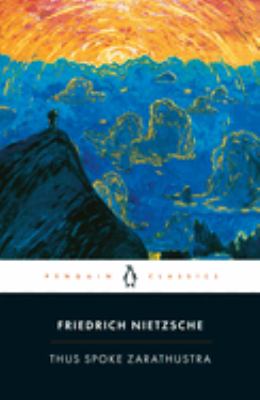Length: 336 pages (plus a 35 page introduction)
What is It: Thus Spoke Zarathustra is a philosophical novel about destruction and power - the destruction of religious tenets and common morality, and the redistribution of that power to the self. Presented in parable form, Friedrich Nietzsche instructs us on how to overcome these societal limitations and become a Superman*. The work, as told through a solitary prophet named Zarathustra, is loosely constructed in four parts which are subdivided into chapters, subtitles, and progressions.
What's Said: Earth is heaven. God is dead. There is only man. Man is a bridge to the Superman. He must be overcome. Will to power** is what elevates man beyond himself to become a Superman. Your spirit wants and needs freedom (from religion and conventional morality) to create its own will. Fear, cowardice, and laziness created the gods and an afterlife. "Good" and "Evil" were created by and for those with their own will to power agenda. Freedom from this demands creation. The highest virtue is creating virtue. In order to create you must be willing to destroy - but first you must love. Love of life should be your highest hope. Your passions should be your virtues. There is no single truth, only individual truth. Embrace solitude - all great things flow from it and away from crowds. Learn to love one's self and not go roaming. All men are not equal, the best want to rule. If you cannot create and obey your own self, you will be commanded. So accept the burden of greatness, find the inner strength to overcome your restrictions, and create for yourself. Moderation is mediocrity. The only way to live life is to view it as an eternal recurrence. What is failure in the face of the future where so much is still possible?
What's True: Nietzsche has tremendous wit and a sharp tongue (prompting many high laughter and cringe worthy moments). Thus Spoke Zarathustra is a rejection of Nietzsche's religious upbringing and philosophical knowledge. Obvious structural references include The Bible and Plato. Parable form makes this a much lighter read than many other philosophical works. Language and style still take a while to get used to. Nietzsche repeats himself frequently - this could have been much more tightly written. It is clear Nietzsche recognizes and upholds the supreme power of the individual over the state, over leaders, and over the masses. To him poets are superficial, priests live for and promote death, and other philosophers tell people what they want to hear. Thus, the meaning of life - to continually overcome one's self and become greater and greater - is inward. Success at this is joy. The Superman loves life so much and masters it so well that he is willing to live the same one over and over again.
So What: This is a book for everyone. In its simplest form, Thus Spoke Zarathustra is a motivational masterpiece extolling the virtues of a better you. Nietzsche wants to you become your best self and walks you past all pitfalls and doubts. He wants you to be free to create your own life, make mistakes along the way, laugh when you fail, and enjoy it all the while, because this is the only thing we know we get for sure.
Final Word: Definite Read
*Ladies, I apologize on Nietzsche's behalf for the domineeringly male focused view of this text.
** Will to power is a central theme for Nietzsche and it is many things: the desire for control over your life - the need to create and set its meaning; the pursuit of power and the removal of fear (i.e., lack of power); the desire to assert yourself; your inner qualities; your self as creator and master; your truth.

No comments:
Post a Comment